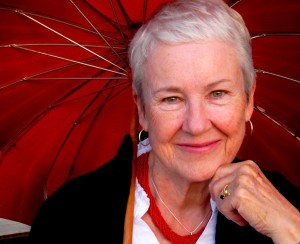We’re proud to announce that Image, the sponsor of this blog, played a central role in the publication of a wonderful new book God For Us: Rediscovering the Meaning of Lent and Easter. Co-edited by Image editor Gregory Wolfe and Image board member Greg Pennoyer, God For Us features meditations for every day of Lent by some of the most highly regarded spiritual writers of our time, including Richard Rohr, Kathleen Norris, Ronald Rolheiser, Luci Shaw, and Scott Cairns.
We are publishing interviews by Paraclete Press with several of the contributors in the next few weeks. Today’s interview features Luci Shaw.
Paraclete Press: How does the title God For Us apply to the weeks preceding Easter?
Luci Shaw: The term God For Us fulfills the promise revealed earlier in God With Us. The birth of Jesus was the beginning of a whole new realm of grace fleshed out in the God-man life. This life and its final years of ministry were destined to take place before the final world-changing events of Holy Week as we remember the Crucifixion and Resurrection of Christ.
The two events at the beginning and end of Jesus’ earthly life are like the parentheses of salvation. One without the other was never part of the divine plan; both were and are vital. Both were and are essential in order for the purposes of God to be fulfilled in redeeming humanity.
PP: Why is the observance of Lent spiritually necessary?
LS: Speaking very personally, I’m convinced that the observance of Lent is spiritually necessary for me, and I suspect for many others, because I am too easily occupied with other busy-making doings that distract and take up time and energy. I know this is detrimental to my soul’s health. I need Lent in order to remind myself to slow down (I love it that the word lent in French means slow).
I need a specific and intentional practice of reading, prayer, and meditation that allows me time enough to ponder something that is both earth-shaking yet too easily taken for granted.
Two years ago during the weeks of Lent I found myself reflecting on personal ambition, whether it is healthy or not. Whether it can be on behalf of the calling I have been given, or simply to fill my never-quite-satisfied need for affirmation and recognition. I spent time each day excavating my feelings, finding guidance in Scripture, writing my observations and realizing that ambition, if unchecked, could easily lead to hubris and self-centeredness.
This coming Lent I’m asking myself what aspect of my life in God needs attention, and if God is shifting my thinking in a new direction.
As a Christian believer I may think I fully understand the purpose of Lent and the events of Passion Week. Yet on reflection I know this isn’t true; I will never be able to appreciate it fully any more than I can comprehend the mysteries of quantum physics.
I am a gardener with a vegetable garden that supplies our family with fresh produce all summer. I like the image of the garden to help me see the significance of Lent. Just as a sown seed takes time in the dark underground to germinate and push up into the light, with leaves and flowers and ultimately fruit, so the six weeks of Lent allow my soul time to pay attention to my growth in God, and his springtime in me.
It can be a time of intimate spiritual appreciation and identification.
PP: How has Lenten observance changed in modern times? Why do you think it has changed?
Unless we are in a church community that allows us to meditate week by week on the meaning of Easter, Lent and Easter can become rather dusty clichés. Commercialization and consumerism, with all its candy, eggs hunts, and chocolate bunnies, may cheapen our observance unless we are able to look beyond the signs and symbols.
I’m just learning where the rabbits entered the picture—in German Lutheran churches in the 1600s rabbits and hares were thought to be symbols of fertility, as were the eggs these little animals were shown carrying in baskets and offering to the children in the churches on Easter Sunday.
Eggs are certainly symbolic of new life and fertility. I have a friend with a Ukrainian background who taught a group of us how to decorate Easter eggs (pisanky) with intricate lines of black wax and brilliant dye baths of scarlet, green, blue, yellow, and black. This is traditionally done on Good Friday, as we gather around a table with our eggs and implements. The wax resist process takes several hours as we inscribe elaborate patterns with little pens of black beeswax (kistkas).
With each successive patterning and dye bath the decoration may look more chaotic, like a series of bad mistakes. But at the end the embellished egg is held close to a candle flame and the melting wax is buffed off with a rag. The result is astounding! Even for a beginner something unexpectedly beautiful is revealed. It’s like watching a resurrection.
In our own day it’s customary for members of our congregations to ask each other: How are you observing Lent this year? Are you wearing your purple sweater? Are you joining a reading group to focus on the Scripture passages that deal with Christ’s final days on earth? A common question is: What are you giving up for Lent? Chocolate? Movies? Novels?
It’s doubtful that any of those minor deprivations will work deeply within our souls. We need a Lenten practice that invites us into the experience of how Jesus, in his own soul-searching, was preparing for a death that would liberate the whole world.
PP: Is Easter possible without Lent?
Emphatically, no! Just as death will not happen unless there has been birth, growth and life, Easter and resurrection can only be real and true if we have experienced the dark misery of dying and bereavement. Morning light is only truly valued when contrasted with the blackness of midnight.
I’m always grateful that the Creator built into our diurnal living the difference between light and darkness, between winter and summer, between life and death. Contrast is one of His most powerful teaching tools, even in the life of His Son.
PP: Is there a particular day of the year that is the most important to you in your own personal, spiritual life?
I wonder. Beside the recurring annual events like New Year’s Day with its resolutions, my birthday, my wedding anniversary, and my children’s and grandchildren’s birthdays, every day has the potential for God to break through to me. On second thought, I love the possibilities of any new day. They can each be my “best” day!
Luci Shaw is a poet, essayist, lecturer, and writer-in-residence at Regent College in Vancouver, B.C. She has authored over thirty books. Widely anthologized, her writing has appeared in Image, Weavings, Books & Culture, The Christian Century, The Southern Review, and others. She is the 2013 recipient of the Denise Levertov Award.












